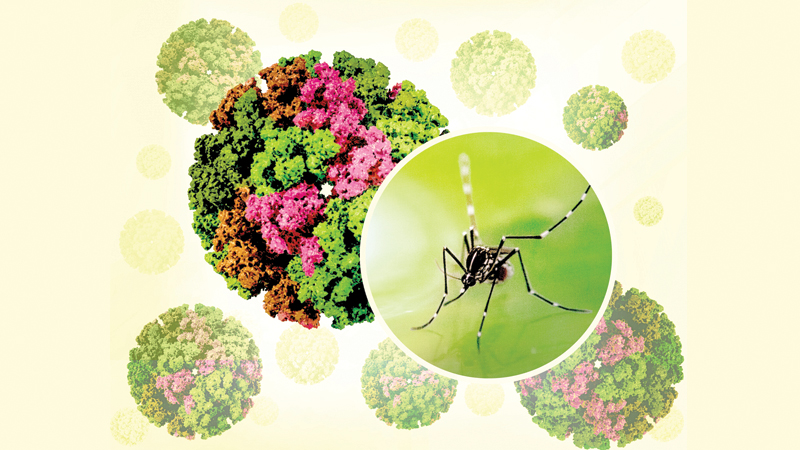 The prevailing heavy showers followed by short periods of sunshine has led to a proliferation of mosquito breeding sites in our neighbourhoods and gardens leading to highly contagious viral infections such as chikungunya.
The prevailing heavy showers followed by short periods of sunshine has led to a proliferation of mosquito breeding sites in our neighbourhoods and gardens leading to highly contagious viral infections such as chikungunya.
However, this disease can easily be contained or reduced drastically simply by keeping one’s neighbourhood, and gardens as well as indoors free of containers, gutters, and other receptacles that attract the vector that transmits chikungunya taking into account that the mosquito has limited flying capabilities.
The Sunday Observer spoke to Associate Specialist Virologist, Teaching Hospital , Anuradhapura, Dr. C. S. Botenne for more insights into this subject about which most people ‘s knowledge is still limited.
Excerpts.
Q: What is the main transmitting agent?
A. It is a mosquito known as Aedes infected with chikungunya virus.
Q: Is it the same mosquito that also causes dengue which is also on the rise at present?
A. Yes, dengue and chikungunya are both caused by the Aedes mosquito.
Q: How do you identify it from the non chickungunya vector?

Dr. C. S. Botenne
A. Aedes mosquitoes show a black and white pattern due to the presence of white/silver scale patches against a black background on the legs and other parts of the body.
They live in or near homes or in neighbouring woods, preferring to live outdoors. They are common in urban areas. The Aedes mosquito is a daytime biter. Its peak feeding times are during the early morning and late afternoon. Female Aedes mosquitoes lay their eggs in stagnant water.
Q: What are the symptoms to look out or in a person who may have the disease?
A. Those who have chikungunya usually experience fever and joint pain.
Symptoms usually begin 3-7 after a mosquito bite. Some can have headache, muscle pain, joint swelling, or rash.
Q: How do they impact the human body?
A. Some can have joint and muscle pain that can last for months or years after they’ve been infected with the virus. Other complications can include severe problems of the eyes, heart and nerves.This can be very severe and disabling. However death from Chikungunya is rare.
Q: Age-wise, who are those most at risk? Elders or children?
A. Yes,those who are at extremes of the age spectrum are at a higher risk for severe disease
Q: At what ages are they most at risk? Why?
A. People at risk for more severe disease include newborns infected around the time of birth, older adults (≥65 years). Neonates are at risk due to an underdeveloped immune system whereas elderly are at risk due to age-related decline in immune function and other pre-existing medical conditions like high blood pressure, diabetes, or heart disease.
Q: Can babies get chikungunya?
A. Yes. Babies can get it as mentioned before. There can be mother to child transmission of chikungunya during pregnancy and delivery. However after the baby is born transmission via breast milk has not been reported.
Q: Will a pregnant woman having the disease give birth to a low weight baby with low iQ?
A. Maternal chikungunya infection during pregnancy can potentially lead to complications such as neurological issues and growth retardation in the baby, which may affect cognitive development and result in lower IQ as the child grows. In some cases, it may also increase the risk of miscarriage. However, there is currently no strong scientific evidence directly linking chikungunya infection in pregnancy to low birth weight.
Q: Can chikungunya result in a low immune system ?
A. No: Chikungunya does not cause reduced immunity or immunosuppression. Your immune system doesn’t become less capable of fighting off other infections just because you had chikungunya unlike in the cases of some viral infections like HIV.
Q: In a person with a preexisting condition like heart problems and diabetes can the symptoms become aggravated due to chikungunya?
A. Yes, pre-existing conditions like heart disease and diabetes can worsen the severity of chikungunya infection. These conditions weaken the immune response and increase the risk of complications. Patients with such comorbidities may require closer monitoring and are more likely to experience severe outcomes.
Q: Iam told there are different types of viruses currently circulating in Sri Lanka that cause Dengue. Is it the same for chickungunya?
A. No, chikungunya is caused by a single type of virus, unlike dengue which is caused by 4 types of dengue viruses.
Q: Which districts and regions have the highest prevalence of chikungunya and why?
A. Most of the chikungunya cases are reported from the Western Province. Colombo District has the highest number.
This is likely due to the tropical climate,especially the monsoons and high humidity and the high population density, which often leads to stagnant water collecting in different places. These conditions are perfect for Aedes mosquitoes, which spread the virus.
Q: It has been said by experts in the field that the current short showers followed by bursts of sunshine can lead to hundreds of mosquito breeding sites islandwide. Do you agree?
A. Yes, I agree. Brief rainfall can create temporary puddles and areas of stagnant water, while the subsequent bursts of sunshine warm these pools, accelerating the development of mosquito larvae and pupae. These conditions provide an ideal environment for mosquito reproduction and increase the risk of virus transmission, ultimately contributing to the spread of diseases such as dengue and chikungunya.
Q: What happens to the mosquito larvae which are found in these sites ?
How long does it take for the larvae to remain active in the water?
A. Mosquitoes initially lay their eggs in stagnant water. These eggs hatch into larvae, which are very active.
 The larvae feed on microorganisms and particulate organic matter. As they grow, they shed their skin and in about 4 to 5 days, they develop into pupae. The pupal stage then transforms into an adult mosquito.
The larvae feed on microorganisms and particulate organic matter. As they grow, they shed their skin and in about 4 to 5 days, they develop into pupae. The pupal stage then transforms into an adult mosquito.
Q: Can a person who has been infected with chikungunya get reinfected ? If so how?
A. Once a person recovers from a chikungunya virus infection, they typically develop lifelong immunity to the virus.
This immunity is due to the development of antibodies that remain in the body and protect against future infections with the same virus.
Q: How long does it take for that person to recover?
A. Most people also recover within one to two weeks. However, some may continue to experience joint pain and swelling, which can persist for months and, in some cases, become chronic, requiring ongoing medical treatment.
Q: Is there a specific treatment for chikungunya ?
A. There is currently no specific antiviral treatment for chikungunya. Management is primarily supportive and focuses on relieving symptoms. This includes adequate rest, proper hydration, and the use of medications such as paracetamol for pain and fever relief. In more severe cases, especially those requiring hospitalisation, supportive care is essential to monitor and manage complications.
Q: Is there a vaccine to prevent chikungunya?
A. Yes, a vaccine to prevent chikungunya is available in certain parts of the world. However, it is not yet available for public use in Sri Lanka. As a result, prevention relies primarily on mosquito control measures and personal protection against mosquito bites.
Q: It has been said that minimising exposure to these diseases in the first week of the disease will prevent further spread within the community. Do you agree?
A. Yes, patients suspected of having chikungunya should take precautions to avoid mosquito bites during the first week of illness.
During this period, the virus is present in high levels in the bloodstream, particularly in chikungunya cases. If a mosquito bites an infected person, it can become a carrier of the virus and potentially transmit it to others, contributing to further spread of the disease.
Preventing mosquito exposure in the early stages of illness is therefore essential to help break the transmission cycle.
Q: What are the Do’s and Don’ts for chickungunya ? Do’s in chikungunya:
-Take adequate rest to help the body recover, stay well hydrated by drinking plenty of fluids
-Use paracetamol (acetaminophen) for relief from fever and joint pain
-Prevent mosquito bites by applying insect repellents, wearing long-sleeved clothing and trousers.
-Using mosquito nets, especially while sleeping
-If you have high fever lasting for more than 24 hours it’s best to go and see a doctor
-Follow a nutritious, balanced diet to support recovery.
Don’ts in chikungunya:
-Do not use aspirin or other non-steroidal anti-inflammatory drugs (NSAIDs), such as ibuprofen, to relieve symptoms, especially if dengue infection has not been ruled out
-Do not allow water to stagnate in containers, pots, or open spaces, as stagnant water serves as breeding grounds for mosquitoes
Q: Have you got a message for readers?
A. Yes. Chikungunya is a viral infection, transmitted by mosquitoes, and currently, there has been an increase in the number of cases in the country.
However, we can combat the spread of these diseases by taking simple measures to reduce mosquito breeding sites and prevent mosquito bites.
If you are suspected to have contracted either infection, it is crucial to follow the recommended health guidelines and encourage your family and neighbors to join efforts in making our community safer from these illnesses.
Key facts
* Chikungunya is a disease caused by the chikungunya virus, which is transmitted to humans by infected mosquitoes, with large outbreaks and sporadic cases reported mostly in the Americas, Asia and Africa, and occasional smaller outbreaks in Europe.
* The symptoms of chikungunya are similar to those of dengue and Zika, making chikungunya easy to misdiagnose and making it more difficult for countries to accurately determine the number of people infected.
* Chikungunya causes fever and severe joint pain, which is often debilitating and may be prolonged; other symptoms include joint swelling, muscle pain, headache, nausea, fatigue and rash. -WHO









